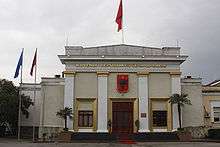Speaker (politics)
.jpg)
The speaker of a deliberative assembly, especially a legislative body, is its presiding officer, or the chair. The title was first used in 1377 in England.
Usage
The speaker's official role is to moderate debate, make rulings on procedure, announce the results of votes, and the like. The speaker decides who may speak and has the powers to discipline members who break the procedures of the chamber or house.[1] The speaker often also represents the body in person, as the voice of the body in ceremonial and some other situations. The title was first recorded in 1377 to describe the role of Thomas de Hungerford in the Parliament of England.[2][3]
By convention, speakers are normally addressed in Parliament as 'Mister Speaker', if a man, or 'Madam Speaker', if a woman. In other cultures other styles are used, mainly being equivalents of English "chairman" or "president". Many bodies also have a speaker pro tempore (or deputy speaker), designated to fill in when the speaker is not available.
Australia
The Speaker of the Australian House of Representatives is the presiding officer of the Australian House of Representatives, the lower house of the Parliament of Australia. The President of the Australian Senate is the presiding officer of the Australian Senate, the upper house of the Parliament of Australia.
Italy
Parliamentarism in Italy is centered on the Presidents of the two Houses, vested in defense of the members and of the assembly as a whole;[4] so "the Speaker invites the representative of the Government not to deviate from the rules of parliamentary behavior".[5] Now constitutional community highlights changes also in this role.[6]
Canada
In Canada, the Speaker of the House of Commons is the individual elected to preside over the House of Commons, the elected lower house. The speaker is a Member of Parliament (MP) and is elected at the beginning of each new parliament by fellow MPs. The Speaker's role in presiding over Canada's House of Commons is similar to that of speakers elsewhere in other countries that use the Westminster system. The Speaker does not vote except in the case of a tie. By convention, if required to vote, the Speaker will vote in favour of continuing debate on a matter, but will not ultimately vote for a measure to be approved.
The Speaker of the Senate of Canada is the presiding officer of the Senate of Canada, the appointed upper house. The Speaker represents the Senate at official functions, rules on questions of parliamentary procedure and parliamentary privilege, and presides over debates and voting in the "Red Chamber". The Speaker of the Senate is appointed by the Governor General of Canada from amongst sitting senators upon the advice of the Prime Minister. The Speaker has a vote on all matters. In the event of a tie, the matter fails.
At the provincial level, the presiding officer of the provincial legidslatures is called the "Speaker" in all provinces except Quebec, where the term "President" is used. The presiding officer fulfills the same role as the Speaker of the House of Commons.
Singapore
In Singapore, the Speaker of the Parliament of Singapore is the head officer of the country's legislature. By recent tradition, the Prime Minister nominates a person, who may or may not be an elected Member of Parliament (MP), for the role. The person's name is then proposed and seconded by the MPs, before being elected as Speaker.[7] The Constitution states that Parliament has the freedom to decide how to elect its Speaker.[8]
While the Speaker does not have to be an elected MP, they must possess the qualifications to stand for election as an MP as provided for in the Constitution.[9] The Speaker also cannot be a Cabinet Minister or Parliamentary Secretary,[10] and must resign from those positions prior to being elected as Speaker.
The Speaker is one of the few public sector roles which allow its office-holder to automatically qualify as a candidate in the Singapore presidential elections.[11]
United Kingdom
The Speaker is the individual elected to preside over the elected House of Commons. The speaker is a Member of Parliament (MP) and is elected at the beginning of each new parliament by fellow MPs.
The Lord Speaker is the presiding officer of the House of Lords. The commonly used "Speaker of the House of Lords" is not correct. The presiding officer of the House of Lords was until recently the Lord Chancellor, who was also a member of the government (a cabinet member) and the head of the judicial branch. The Lord Chancellor did not have the same authority to discipline members of the Lords that the speaker of the Commons has in that house. The Lord Speaker is elected by the members of the House of Lords and is expected to be politically impartial.
United States
Federal
The Speaker of the United States House of Representatives presides over the lower house of Congress, the House of Representatives. This post is second in line to the presidency—after the vice president—and is therefore the third highest-ranking national office overall. In practise, however, this post is the highest-ranking in Congress as although the vice president is the President of the US Senate, his/her office and predominant responsibilities are White House, and therefore they do not have a day-to-day presence at Congress.
States
In the forty-nine states that have a bicameral legislature, the highest position in the lower house is usually called the "speaker". In Nebraska—the only state with a unicameral legislature—the senators elect one senator to serve as "Speaker of the Nebraska Legislature". In Tennessee, the senators elect a "Speaker of the Senate" who presides over the Tennessee Senate and serves as lieutenant governor.
Similar posts

The presiding officer for an upper house of a bicameral legislature usually has a different title, although substantially the same duties.
When the upper house is called a senate, the equivalent title is often President of the Senate. Australia, Chile, the United States and many other countries have upper houses with presiding officers titled "president". In several American republics, the vice president of the country serves as the president of the upper house.
This pattern is not universal, however. Some upper houses, including those of Canada, have a speaker.
The Presiding Officer of the National Assembly for Wales, Presiding Officer of the Scottish Parliament, and Presiding Officer of the Northern Ireland Assembly fulfill the same role as the speaker.
List of current speakers
See also
- Generic
- Speaker of the senate (disambiguation)
- Speaker of the House of Assembly (disambiguation)
- Speaker of the House of Commons (disambiguation)
- Speaker of the House of Representatives (disambiguation)
- Speaker of the Legislative Assembly
- Speaker of the National Assembly (disambiguation)
- List of current presidents of assembly
- Specific
- Speaker of the Senate of Canada
- List of Speakers of the House of Commons of England
- Cathaoirleach (Speaker of the Irish Senate)
- Speaker of the Legislative Assembly of Ontario
- Speaker of the Palestinian Legislative Council
- Marshal of the Senate of the Republic of Poland
- Lawspeaker
- Lord Speaker (Speaker of the United Kingdom House of Lords)
- Speaker of the United States House of Representatives
References
- ↑ As in case of disorders in the floor: Italian traditions knew cases of extreme contestation, not much different from tumults stigmatized in Ukrainian parliaments, Taiwanese and South Korean: Buonomo, Giampiero (2014). "I tre giorni della supercazzola". L’Ago e il filo edizione online. – via Questia (subscription required)
- ↑ Journal of the House of Commons: January 1559; 1559; accessed August 2015
- ↑ Lee Vol 28, pp. 257,258.
- ↑ Mancini and Galeotti believed that "in the enclosure of the House the exercise of presidential power should not be limits or obstacles whatsoever" (Mancini-Galeotti, Norme ed usi del Parlamento italiano, Roma, 1887, pag. 97).
- ↑ (in Spanish) Sanciones disciplinarias y policía interna en el ordenamiento parlamentario italiano ‘’AA.VV., Derecho parlamentario sancionador’’, Eusko Legebiltazarra, Parlamento Vasco ed., 2005p. 236-271
- ↑ F. Bilancia, L’imparzialità perduta (a proposito dei Presidenti di Assemblea parlamentare), in Aa.Vv., Studi in onore di Gianni Ferrara, vol. I, Giappichelli, Torino 2005, pp. 311 ss..
- ↑ Lee, Min Kok (8 January 2016). "Halimah Yacob to be renominated as Speaker of Parliament: 7 things you may not know about the post". The Straits Times. Archived from the original on 7 August 2017. Retrieved 7 August 2017.
- ↑ Constitution of the Republic of Singapore, Art. 40(2).
- ↑ "Speaker of Parliament". Parliament of Singapore. Archived from the original on 7 August 2017. Retrieved 7 August 2017.
- ↑ Constitution of the Republic of Singapore, Art. 40(2).
- ↑ Constitution of the Republic of Singapore, Art. 19(3)(a).
- ↑ "Shirin to become first woman Speaker". bdnews24.com. 29 April 2013. Retrieved 29 April 2013.
- ↑ "01 September confirmed as date for Vanuatu Presidential Election". Islands Business. 2009-09-02. Archived from the original on 2012-02-23. Retrieved 2009-08-20.
Further reading
- Bergougnous, Georges. Presiding Officers of National Parliamentary Assemblies: A World Comparative Study. Trans. Jennifer Lorenzi. Geneva: Inter-Parliamentary Union, 1997. ISBN 92-9142-028-X.
- Green, Matthew N. The Speaker of the House: A Study of Leadership (Yale University Press; 2010) 292 pages; US House
